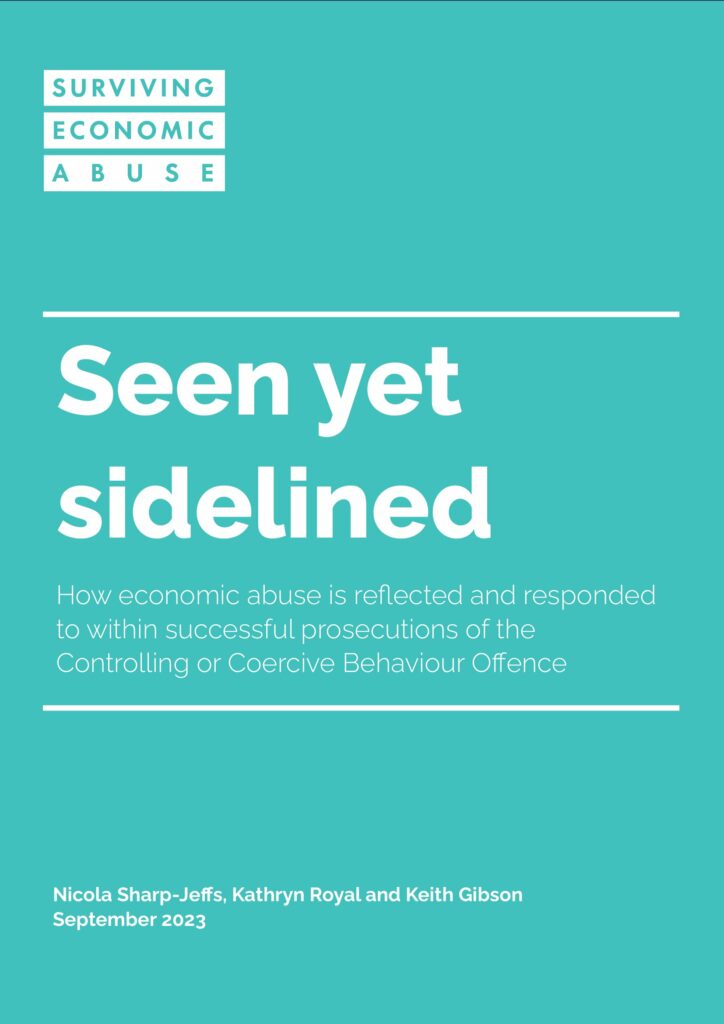Every 20 minutes a victim-survivor of economic abuse reports to the police.
Our new report Seen yet sidelined, funded by Barclays UK, reveals that economic abuse is no longer ‘hidden’ in plain sight. Up and down the country experiences of economic control are being shared by domestic abuse victim-survivors with police officers and in courts.
In December 2017 we published Into Plain Sight, the first analysis of economic abuse within successful prosecutions of the Controlling or Coercive Behaviour (CCB) Offence.
The report made economic abuse visible for the first time, by showing that economic control was a feature in 60 per cent of cases.
The CCB Offence has provided a legal framework within which to hold perpetrators of economic abuse accountable. However, our new report, Seen yet sidelined, reveals that despite these changes to the law victim-survivors are still not getting the criminal or economic justice they deserve, making it impossible to move on with their lives.
Key findings
By analysing 810 successfully prosecuted offences of controlling or coercive behaviour, Seen yet sidelined found that nearly two-thirds (64%) of cases reported in the press reference economic abuse.
Despite this high prevalence and economic abuse now being recognised in law, we found that the criminal justice system is not using its powers to fully hold perpetrators of economic abuse to account or support victim-survivors to achieve justice.
The report discovered that bringing multiple charges to court, rather than evidencing all the abuse within a single charge of coercive control, resulted in plea-bargaining, more lenient sentences being handed down and victim-survivors feeling like criminal and economic justice has not been served. We also found that:
- Controlling or coercive behaviour was prosecuted as a standalone offence in only a third of cases, with physical assault making up over half (53%) of additional charges.
- The average prison sentence for controlling or coercive behaviour offences featuring economic abuse is less than two years – less than half the maximum possible sentence.
- Despite the loss and damage described within the known economic abuse cases, just 2% resulted in the perpetrator being ordered to pay compensation to the victim-survivor.
Recommendations
The Victims and Prisoners Bill is a golden opportunity to move economic abuse out of the shadows to make sure victim-survivors are better supported and perpetrators are held to account. The Bill should:
- Make police training on controlling or coercive behaviour and economic abuse mandatory to help police proactively identify and gather evidence of it.
- Ensure victim-survivors experiencing economic abuse can access specialist support to re-establish their economic safety.
- Increase the use of court-awarded compensation and the confiscation of assets derived from criminal conduct during sentencing so victim-survivors do not have to pay the price for abusers’ crimes.
- Work with credit rating agencies to identify a way to re-establish victim-survivors’ credit rating to help them rebuild their lives.
Download the report

This report is dedicated to Kellie Sutton, whose experiences of coercive control are shared in the report. We are grateful to Kellie’s family for their support in dedicating the report to her memory.
Join the conversation
If you’d like to share Seen yet sidelined on social media, don’t forget to tag @SEAresource and use #SeenYetSidelined

